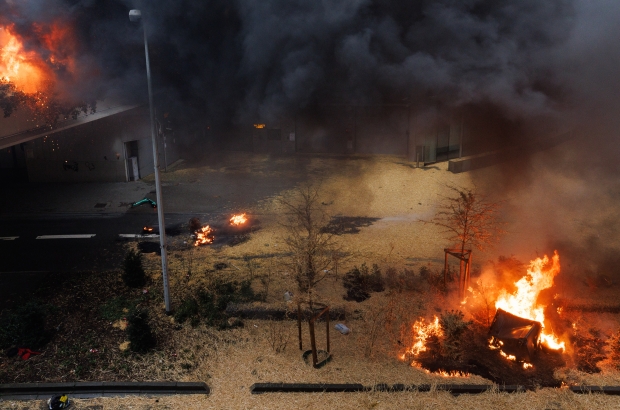- Daily & Weekly newsletters
- Buy & download The Bulletin
- Comment on our articles
Farmers' protest results in property damage, police injuries
The latest demonstration of farmers in the Belgian capital on Monday resulted in three injured police officers and "particularly bad damage" to public property, according to Brussels authorities.
Farmers and unions gathered en masse to voice their dissatisfaction with a range of issues, including trade agreements, low profit margins, the financial sustainability of family farming and oppressive bureaucracy.
According to a count by the Brussels-Capital/Ixelles police, the numbers included 900 tractors, some of which dumped straw and debris on to the streets and police blockades. Almost 700 foreign demonstrators were also present, mainly from Italy and Spain.
The protest caused significant traffic disruption both inside and outside the city. Public transit was also disrupted with multiple metro stations closed.
The demonstrators gathered on the sidelines of a meeting of EU agriculture ministers, at the end of which Belgian minister David Clarinval and European agriculture commissioner Janusz Wojciechowski received a delegation of farmers.
“They made short-term commitments to refinance the CAP (Common Agricultural Policy) and long-term commitments to analyse free trade agreements,” said Florian Poncelet, president of the French Federation of Young Farmers (FJA).
“When you consider the length and duration of procedures at the [European] Commission, this is no mean feat.”
While previous protests and demonstrations from farmers were largely peaceful, Monday’s was more destructive.
Demonstrators set fire to plastic, tyres and straw, causing clouds of black smoke. Police deployed water cannon several times to extinguish the fires and the fire brigade also had to intervene.
Several clashes broke out and the police used tear gas on multiple occasions to disperse demonstrators who tried to break through the police blockade. Some protestors played the song "Baby Shark" from their tractors.
Demonstrators threw empty bottles, public furniture - such as benches - and eggs at police, resulting in three injured officers. Nothing is currently known about their condition.
“An investigation was immediately launched to identify the rioters based on the analysis of images,” police said.
Most of the protesting farmers dispersed by 16.00, leaving behind a good deal of rubbish.
“The Rue de la Loi must now be cleared to see if there is damage to the road surface and bridge structure,” said Inge Paemen, spokesperson for Brussels Mobility.
While no further action is planned at present, Poncelet warned that if the commitments made by the European commissioner for agriculture do not progress at the speed the farmers' unions would like, “there is a risk of further action”.
Belgium’s interior minister Annelies Verlinden (CD&V) criticised the disruptive nature of the latest protest.
“If farmers are allowed to gather again in Brussels to make their voices heard and to call for respect and attention to their work and future, they should also show that same respect to the many police officers who are leading the demonstration in the right direction,” Verlinden (CD&V) said.
"Our police are first and foremost committed to maintaining and restoring public order. But I also ask the police forces to identify rioters, especially if the orders of our policemen are not followed and if persons get hurt.
"The right to demonstrate is dear to us. It should therefore be treated with respect."
Farmers’ union Boerenbond also issued criticism of the violence.
“The protests in Flanders in recent weeks have always been serene and safe – what we see in Brussels is in stark contrast,” said spokeswoman Elisabeth Mertens.
"This is not our way of taking action. These organisations and individuals are doing this on their own responsibility.
"For us, what matters is the message that people want to send here today, which is to call on European policymakers to recognise the strategic importance of the agricultural sector."
The demonstration was an initiative of, among others, the European organisation Via Campesina (ECVC), which represents small and medium-sized farms.
From Wallonia, the main farmers' organisations taking part were Fugea, FWA (Fédération Wallonne de l'Agriculture) and the young farmers of FJA (Fédération des Jeunes Agriculteurs). On the Flemish side, Boerenbond and the United Young Farmers were represented.
Photo: Benoit Doppagne/Belga


















Comments
And that should be the last time we let the Farmers come to Brussels.
They have the right,
They were given the right,
They abused the right,
The right is now gone!!
Well, as they clearly came to make a mess, it’s only matter of time when all these tractors will be treated with Molotov cocktails next time…